- Home
- Steve Erickson
Rubicon Beach
Rubicon Beach Read online
He never had but the one home
staring him in the eye.
WILLIAM CARLOS WILLIAMS
* * *
I got out late winter. I was off on the exact day by thirty-some hours, which is not bad calculations. I made the decision when I went in to keep track of the days, for the simple reason that it was the intention of my jailers to jettison my sense of time and place. They brought you in a metal truck with no windows and took you out in the same truck or one damned similar. The rumor was that Bell Federal Penitentiary was somewhere in the plains of the Montana-Saskatchewan annex. The sight from my cell would not have refuted this. The white of the snow and sky filled my eyes like the sheet pulled over the head of a dead man. If it was not Montana-Saskatchewan, then it was the North Pole, or the moon. It was a signal to anyone who’s ever doubted the terror of an idea that almost all of us in this prison that had no time or place were utterly guiItless of a violent act, unless one counts the violence of tongues.
I wasn’t one of them. Maybe I should have been. I wasn’t one of any of them; probably I should have been. Ben Jarry asked me once, How long you think you can be neither one nor the other? and I said, As long as I choose. Because I chose to be neither, it never occurred to me that anything I did could have ramifications. One day I told some guy a joke and the next day they hung Ben Jarry with it. Then they let me go, not because they appreciated my sense of humor but because they understood it was the worst thing they could do to me. They knew I’d tell that joke in my sleep forever. Virtually every moment of the two years and four months I sat in Bell Pen I imagined what it would be like to be out, I imagined the ride out the iron gates in a metal truck with no windows. I was so innocent that it never occurred to me there might never be such a ride. I waited for it. I kept track of the days. Then I told some guy a joke and stopped counting the days, at which point I got the ride in the metal truck. Some time in this period, between the joke and the ride, I lost those thirty-some hours. My jailers were ironic people.
The metal truck took me to Seattle. We got there around one in the afternoon. The door of the truck opened and there was a pier; the glitter of the sea was like glass in my eyes. I just sat in the back of the truck until someone said, Move. I stepped into the street, the guard slammed the door, and the truck rolled off, leaving me there with the clothes on my back. Then someone in a brown suit walked up to me and said, Are you Cale? He saw the look on my face and watched me watch the truck and said, Follow me. I said to him, I had this feeling I was going to be on my own; he could see I was relieved. Not a chance, he answered; what, you think we’re not going to keep track of you? We’re going to keep track of you. The two of us walked back toward this little corrugated shack on the pier. Maybe, I said to him, I’ll just slip away sometime, what’s to stop me from doing that? We got to the door and he opened it and turned to me and said, And where you going to go, Cale? Besides, he said, you’re on our side now. Have you forgotten? You nailed Ben Jarry for us, remember? I said to him, It was just a joke; and he said, Yeah old Ben would laugh his head off right now, if he could get a little breathing room around the neck.
And he said that to me, and I knew from there on out everything was going to be a windowless metal truck, wherever I went and for as long as I lived. And they got me on this boat going down the coast to Los Angeles, and not a soul to be seen on shore for five days and fifteen hundred miles except a soldier here and there, the guards at the Northwest-Mendocino frontier. We came into L.A. middusk. Behind us the sky was yellow and black and the city was blue and orange. It took two hours sailing in, past the blank smoky moors of the Hollywood Peninsula to our north, navigating our way through the outlying swamps where the Hancock Park mansions loomed in ruin, sea water rolling in and out of the porticoes around the doors. Sometimes in the upper floors of a couple of the big houses you could catch a light burning, which would suddenly go out as our boat neared—squatters hushing their fires because they thought we were the feds. On an island to the south stood a large empty hotel. We crossed the rest of the lagoon into Downtown and then up the main canal. I could see the smaller canals trickling off between the buildings which were black like the mansions behind us, and there was a sound from the Chinese storefronts along the water. It was like bubbling music. What’s that sound, I said to someone on board, who did not answer; some guy was calling to him from the dock something about the cargo, and the one on board called back glancing my way. I was the cargo. I realized why we’d kept our distance from the peninsula, they figured I’d jump ship and swim to the cliffs, or maybe take a jump over the side back in the swamps and make for one of the houses. They did not understand, or else did not believe I understood, the concept of absolution. When the guy pulled me up onto the dock I saw the look in his eyes. Didn’t matter whether he knew Ben Jarry or not, or whether he believed the things Ben believed. If I’d hung Jarry myself or even slit his throat, these people couldn’t have had greater contempt for me; that would only have been murder, a lesser sin than treachery. And I realized why we’d sailed as near the cliffs as we had: I’d never have made it alive, but they wouldn’t have minded my trying.
I was set up in the Downtown library to live and work, even paid a small wage for doing it. It was one of the conditions of the parole. The library was a hundred-foot tower with a point at the top and the bottom running off in four directions like the wax of a tall gray candle—catacombs of words and dust, manuscripts that nobody read stacked in corners. The library and hall of records were consolidated to serve the urban L.A. population, such as it was. Running the library, I was guaranteed to have contact with almost nobody. I don’t think it was intended I should like it in the high tower of the Downtown library. I think someone figured it would seem a bit like jail. I liked it quite a bit; after all, it seemed a bit like jail. A narrow circular stairway led up to a small white room where a narrow uncompromising bed waited in the corner. Beside the bed was a small table. There was a desk, which I had not had at Bell, at the window, and the sight from this cell was an improvement as well, no doubt of that—not the wastes of the annex but the harbor four blocks north where I came in, and to the west in the distance the swamps and the angry blare of the sun muttering through the trees. In the spring and summer I heard the prostitutes lived out there and had their men on the banks, and the vines of the lagoon glistened with the sap of women’s legs.
My duties were threefold. The first was to make sure that in the files of the library all entries beginning with the letter A always preceded those beginning with B. The second was to make sure those doors that were now locked remained locked except to guys in suits with keys. Every once in a while a guy in a suit with a key would show up at the library and unlock a door and disappear inside. Sometimes I caught a glimpse of the books on high shelves. It should go without saying that I did not have any important keys myself, at least not yet. The third duty was to vacate the premises of squatters every night. In my first three weeks I found only one woman with a red sack that I suspect contained a small human being. I left both the woman and her sack alone. “But in the morning,” I said to her, “you have to be gone.”
I never closed up the building when I went out in the evenings; I wasn’t expected to. As I said, I had no keys. It didn’t bother me that I was followed; I knew it was routine. The feds weren’t trying to fool me, they were out in the open. I wondered why they followed me since there wasn’t any place to go; a few guards at the canal gates and bridges would have kept me in town. It was possible, I guess, that someone could vanish into the cracks of Los Angeles and drop out of sight. But you still weren’t going anywhere. You still had to come out somewhere in Los Angeles. I hadn’t been in town long before I noticed that music was everywhere, the music I heard out
of Chinatown that first night. It came out of the buildings, a distinct and different melody out of each one. The few people you did run into hummed a lot. The addresses of the doors were scratched and defaced; there were no signs on the street corners. Ask someone how to get to this place or that and he’d sing you the directions.
I kept asking people where the sound came from and finally someone explained, The sea, the sound was the sea, seeping in under the city and forming subterranean wells and rivers. The rivers made a sound that came up through the empty buildings, and the echoes of the buildings made a music that came out into the streets. One day you’d see a building standing upright and the next day it was entirely collapsed, the earth caved in around it, the music turning into a hiss from out of the rubble. In Chinatown they called the shops along the water the Weeping Storefronts; at night you could hear them gurgling and howling in the dark all the way from the library tower. I went there one night after checking out an isolated hardware store for a radio. The clerk asked if I was a cop. I’m no cop, I said. He thought about it a moment and looked me over and then said, No radios here. I’m a law-abiding citizen, he said. He said, You new around here or what? and I said, Sort of, and he said, Check out Chinatown, bub, but watch it. I went to two merchants in Chinatown before the third led me into a back room and asked for the fifth time if I was a cop and sold me a transistor radio. He wrapped it in paper and had me put it in my coat pocket and let me out the back door. By now I knew there was something wrong. But I had the radio and didn’t notice anyone following me for a change, so after walking briskly along the wharf toward home I decided maybe I wasn’t in such a hurry.
Staring into the sun from the harbor, I saw before the shadowmansions of the lagoon something like a black mountain rising from the water, alive with insects; not until it blocked out the sun entirely could I tell it was a boat. Its dark wood hull was blotched with oil and slime, and a cloud of soot hovered over the deck. The deck was swarming with voices, Asian and Spanish and Portuguese and German, to the dull percussion of the tide and the sobbing of the storefronts at my back. The vessel glided past the first dock where I had originally disembarked and then headed into the canal gate, its engines cut and the whole hulk of the thing slipping along soundlessly. The silence of it snuffed the yammering of the people. Just a lot of faces, old Chinese women in scarves and bareheaded Latinos and their wives and here and there a child, all watching from the edge of the boat—or so I thought. When they got right next to me about thirty feet away I saw, in the fast groan of the last sun and the few nagging lights of Chinatown, the nullified blaze of all their dead eyes; every one of them was blind. A towering wooden crate of blind people drifting the waterways of East L.A. I turned around and took my radio home.
At the library I closed the doors and slid the boIt without checking for squatters first. If there were squatters tonight, room and board was on me. I read at my desk awhile and went to bed. Not long after turning out the light there was a dull thud in the distance, so quiet I might not have noticed but for the way the tower shook. It lasted only a few seconds but I lay there half an hour gripping the sides of the bed so hard I could have broken my hands. Then I got up and took a shot of brandy and got back in bed and read some more and tried to fall asleep. There was the sound of sirens and shouting. Finally the music put me out—the city music, not my radio—and I noticed it was different music, the sound of the buildings in the distance had changed. The last thing I thought of was all those blind people watching me across the water.
Two or three nights later I was sitting at my desk and looked up and there was someone in the doorway. He was huge black man, a little under six and a half feet tall; a few more inches of him on each side and he wouldn’t have fitted the space in the wall. His hair was cut close to his head and speckled with gray, and his flat face looked as if it were pressed against a window, except there was no window. There was a step up into my room and he took it. He made no apologies for his sudden appearance, even though I’d been visibly startled. His voice was much softer than I would have thought. Are you Cale? he said. He might have been there to kill me for all I knew; that was a serious possibility. I was a little relieved that it mattered to me much. By now I thought I didn’t care who killed me; it had been months since I cared about being free or being alive enough to know freedom. Now, seeing this black monster, I cared a little, at least until the scare in me died. Then I didn’t care again. Let’s assume I am, I said, then what happens?
“Then,” said the monster, “I come in and have a seat.”
“You’ve already done half that.”
His head barely cleared the low ceiling of the tower. He admired the view of the harbor. He took in the bed and the desk and the small radio I’d gotten in Chinatown and then me. He sat on the bed and the mattress wheezed under him. “Mister Cale,” he said in this distant voice, “my name is Jon Wade. I’m a federal inspector. Would you like to see my credentials?”
“Sure.”
He took credentials out of his coat and handed them to me and I handed them back. “I came in from the seaboard last night,” he said, putting the credentials away, “on a special assignment. I thought that while I was here, we should get to know each other.”
“What for?”
“I will be seeing you and you will be seeing me. It’s an empty little town and we’re bound to run into each other. The police, as I think you’re aware, have you under surveillance. Personally I would rather use them for other things. My understanding of your case is such as to lead me to conclude surveillance isn’t especially necessary. My understanding of your case is such as to lead me to conclude you’re not going anywhere. I believe you’re a man who takes his prison with him—I think you follow me. But for me to take these officers oil your detail requires you and I getting our signals straight. Because as I think you know, or as you should know, part of that surveillance is not just keeping you on a long tether—”
“Not that long.”
“Not that long, all right, part of that surveillance is not just keeping you on a tether, but also making sure that, for the time being, for as long as the government chooses to keep you on parole out here in the territories, you do not get your brains smeared across any random urban edifice.”
“Does the government really care?” I said.
“Well, Mister Cale,” he said, sinking across the width of the bed into the wall, “it does and it doesn’t, you know. It does and it doesn’t. At some point it’s not going to give a good God damn where your brains are; the public-relations value of their whereabouts is short-lived. But for the moment the government thinks you’re a fine example. It likes the idea of a man who sells out his compatriots.” He stopped and waited for me to react. He shrugged. “My own understanding of your case is such as to lead me to conclude that the government cares more about your welfare than you do yourself.”
“If I’m ready to let someone blow my brains out, there’s not much you can do about it.”
“Exactly my own feelings,” Wade said. He laboriously unfolded himself from the bed, standing in midroom and fairly filling it. “But my superiors still want you alive for a while, and I don’t want to expend the energies of the local officials keeping my superiors happy. So I’m asking you to be a little careful, not embarrass me either by getting yourself taken out or by violating any of the local ordinances. For instance,” he said, watching the radio on my desk, “there is a local ordinance against radios. A misdemeanor of course, but in the case of a felon on parole even a misdemeanor is a lot of incrimination.”
“I didn’t know about the ordinance,” I started to say.
Wade raised his hand. “Don’t.” Watching the radio he said, “I’m sure you’ve broken no laws. If I knew you had broken any laws I’d have to arrest you, and it’s tedious. I have other things. If I knew you had a radio I’d have to take you in. Please, don’t. I know that I can assure my subordinates that your excursion into Chinatown the other night had nothing to
do with any radio. If you had bought a radio,” he said, still staring at it, “by now you would have known enough to deep-six it in a canal somewhere. That makes life easier for me and for you.”
“It’s silly,” I said.
“We live in silly times,” he said. “In a town where music is the topographical map, radios are compasses of anarchy. The music of the earth is legal and the music of men is not. I don’t make the fucking laws.” He said, “Get rid of the radio, Cale,” Then he turned and went to the door. He said, “It’s enough I have to deal with guys messing with the music of the earth. You feel the shaking the other night?”
“I thought it was a quake.”
“That’s fine,” he said, “we’d as soon everyone thought it was a quake. Someone set off an underground explosion a couple miles northwest of here out on the peninsula. Redirected one of the underground rivers. Now the whole section of town other side of the harbor’s got a new melody. It’s a genuine subversive fuck-up. You want to tell me about silly? Of course my superiors on the seaboard think it’s political, because they think everything’s political. Because everything is political. So they wonder about you, of course. You’re not setting off underground explosions, are you Mister Cale?”
“Not lately.”
“Not of the geological sort anyway,” said Wade. “Well, all right. Consider yourself grilled and interrogated on the matter. My own understanding of your case is such as to lead me to believe it will suffice.” He paused a moment, looked at me sideways and nodded a bit and walked out. The dark of the library blotted him up; soon he was a tan coat floating in space. Then the dark of the library blotted up the tan coat too.
After I’d been in Los Angeles a month it seemed like a long time. Not forever: forever would preclude the days in a metal truck, and I hadn’t been anywhere so long as to forget those. Forever in Los Angeles would have precluded the experience of my conscience, the life of which stayed with me like the flashes of previous incarnations. Jon Wade did not come up to the tower again. It was the nature of the way and time I had been here that every such incident became a landmark. I left the library more and more. I don’t think the police appreciated it, but nobody said anything. Their understanding of my case was such as to lead them to conclude I was beyond the persuasion of threat; and they were right. Large black birds covered the town streets in malevolent flocks. The canal waters were always filled with artifacts—chairs and framed pictures, masks of gold leaf and music boxes in which cartoon characters danced behind small windows. The sound of the buildings had indeed changed since the night my tower shook. Blasted abandoned eateries and black doorless taverns gurgled and hissed in a new key. To most of the town’s population, which was largely old men and frightened indigents, it made life all the more disorienting. For myself it was one of the things that made a long time seem less like forever.

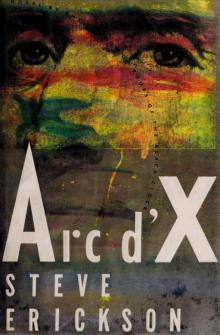 ARC D’X
ARC D’X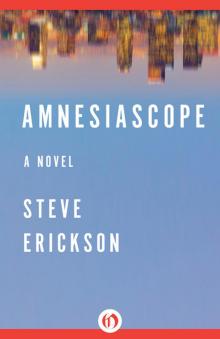 Amnesiascope
Amnesiascope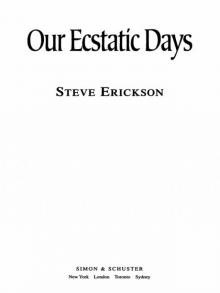 Our Ecstatic Days
Our Ecstatic Days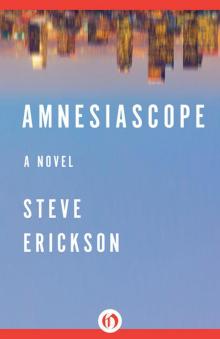 Amnesiascope: A Novel
Amnesiascope: A Novel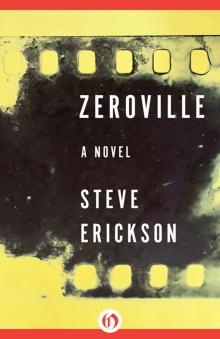 Zeroville
Zeroville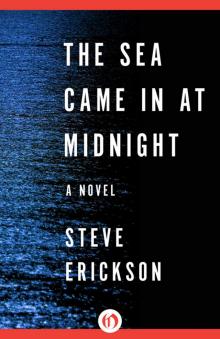 The Sea Came in at Midnight
The Sea Came in at Midnight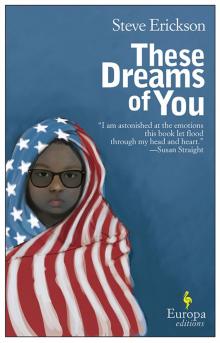 These Dreams of You
These Dreams of You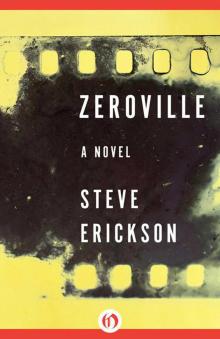 Zeroville: A Novel
Zeroville: A Novel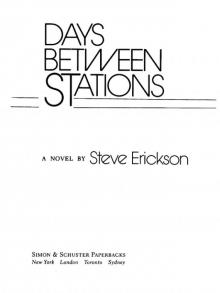 Days Between Stations
Days Between Stations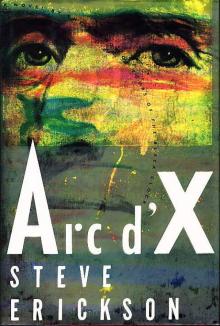 (1993) Arc d'X
(1993) Arc d'X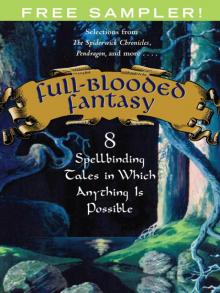 Full-Blooded Fantasy
Full-Blooded Fantasy